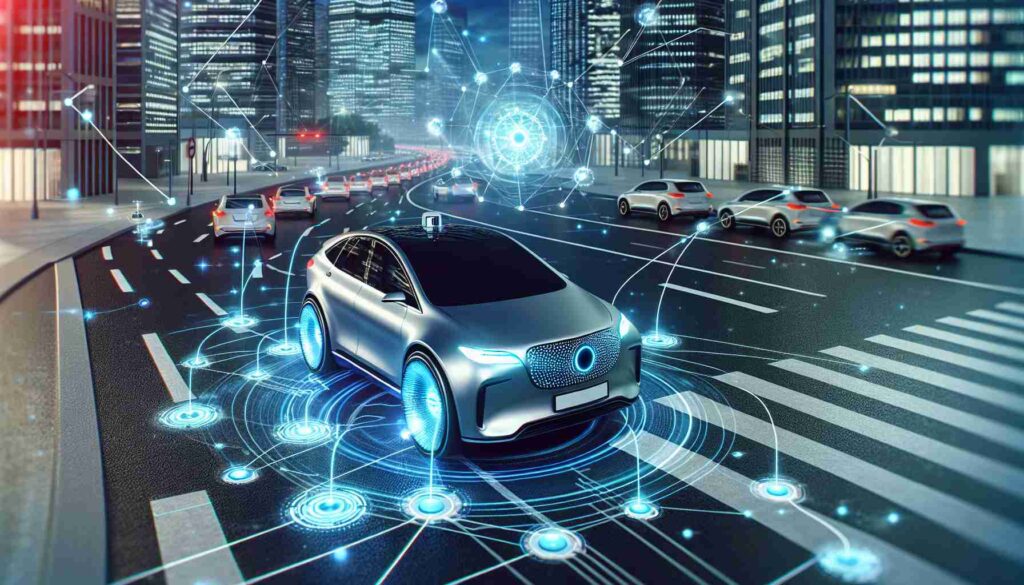Technology breakthroughs aiming to change how people interact with cars are driving a revolution in the automotive sector. Leading this change are autonomous and self-driving vehicles, which have the potential to transform personal mobility with increased convenience, safety, and efficiency. At the core of these innovations are complex systems that require precise control and robust functionality. Planetary gear motors are a critical component in these systems, playing a pivotal role in delivering the precision and reliability required for autonomous vehicle functions.
In this article, we will explore how planetary gear motors are shaping the future of autonomous and self-driving cars, the essential role of planetary gear motor manufacturers in advancing this technology, and the complementary role of coreless DC motors in driving efficiency and accuracy in autonomous vehicles.
The Growing Role of Planetary Gear Motors in Autonomous Vehicles
To navigate highways and engage with their surroundings, autonomous and self-driving automobiles depend on a wide range of sensors, cameras, radar, and control systems. These systems must operate with exceptional precision and reliability to ensure safe and efficient driving. Planetary gear motors have emerged as a key solution in enabling the advanced motion control and precise actuation necessary for these vehicles.
Because of its special design, which consists of a central sun gear encircled by many planet gears contained in a ring gear, planetary gear motors are perfect for autonomous vehicle systems. This configuration allows planetary gear motors to deliver high torque, smooth operation, and a compact design—all critical factors for the demanding needs of self-driving cars.
Key Applications of Planetary Gear Motors in Autonomous Cars
Planetary gear motors are used in several critical components of autonomous and self-driving vehicles. These motors enable smooth, reliable operation for systems that require precise control, including:
1. Steering Systems
In autonomous vehicles, steering systems must respond rapidly and accurately to input from the vehicle’s control unit. Planetary gear motors are well-suited for this application due to their ability to provide precise control over rotational movement while delivering high torque in a compact form. These motors allow for more accurate adjustments to the vehicle’s steering angle, improving safety and stability in self-driving scenarios.
2. Drive-by-Wire Systems
Drive-by-wire technology is central to the functionality of autonomous vehicles, replacing traditional mechanical controls with electronic ones. Planetary gear motors are often used in drive-by-wire systems to control critical functions such as throttle, braking, and gear shifting. These motors offer the precision and reliability required to ensure smooth operation, even in high-stress driving conditions.
3. Lidar and Sensor Positioning
Autonomous vehicles rely on various sensors, such as lidar (light detection and ranging), to detect obstacles, pedestrians, and other vehicles. These sensors need to be positioned accurately and often require dynamic adjustment during operation. Planetary gear motors provide the fine control needed to adjust and stabilize these sensors, ensuring that they maintain optimal positioning for accurate data collection.
4. Adaptive Suspension Systems
Planetary gear motors are also finding applications in advanced adaptive suspension systems. In self-driving cars, suspension systems need to respond dynamically to changing road conditions to ensure a comfortable ride and maintain vehicle stability. The high torque and precise control offered by planetary gear motors enable rapid adjustments in suspension systems, improving the overall performance and ride quality of autonomous vehicles.
The Role of Planetary Gear Motor Manufacturers in Advancing Autonomous Vehicle Technology
The integration of planetary gear motors into autonomous vehicle systems requires highly specialized designs tailored to the specific demands of self-driving technology. This is where planetary gear motor manufacturers play a critical role.
These producers are leading the way in creating cutting-edge motor solutions that satisfy the exacting specifications of driverless cars. As automakers push the boundaries of what autonomous cars can achieve, planetary gear motor manufacturers must continue to innovate, designing motors that offer higher torque, better efficiency, and improved durability—all while keeping size and weight to a minimum.
Some of the key areas where planetary gear motor manufacturers are making an impact include:
Miniaturization: As autonomous vehicles incorporate more complex systems, space becomes a premium. Manufacturers are developing smaller planetary gear motors that deliver the same high torque and precision in a compact package, allowing for more flexible integration into vehicle designs.
Improved Durability: Autonomous vehicles are exposed to a variety of operating conditions, including extreme temperatures, vibrations, and long periods of continuous use. Planetary gear motor manufacturers are working to enhance the durability of their motors, ensuring that they can withstand the rigors of autonomous driving environments.
Energy Efficiency: With the push toward electric and hybrid vehicles, energy efficiency is more important than ever. Planetary gear motor manufacturers are focused on creating motors that offer high performance with minimal energy consumption, helping to extend the range and efficiency of autonomous electric vehicles.
The Complementary Role of Coreless DC Motors in Autonomous Vehicles
While planetary gear motors provide the torque and control necessary for many of the core systems in autonomous vehicles, coreless DC motors play a vital supporting role in enhancing the overall efficiency and performance of these systems.
1. Precision in Smaller Actuators
Coreless DC motors are known for their lightweight design and high efficiency, making them ideal for smaller actuators and precise applications. In autonomous vehicles, coreless DC motors are often used in conjunction with planetary gear motors to control sensors, cameras, and other components that require rapid, accurate adjustments.
2. Energy Efficiency
The excellent energy efficiency of coreless DC motors is one of their main benefits. These motors consume less power than traditional DC motors, making them ideal for use in electric vehicles where conserving battery power is essential. When integrated with planetary gear motors, coreless DC motors contribute to the overall energy efficiency of the vehicle, helping to extend driving range and reduce energy consumption.
3. Enhanced Responsiveness
Coreless DC motors offer quick response times, which are essential for real-time adjustments in autonomous vehicle systems. Their ability to provide rapid and precise control makes them a perfect complement to the high torque output of planetary gear motors, ensuring smooth and responsive operation across a range of vehicle functions.
The Future of Planetary Gear Motors in Autonomous Vehicles
As autonomous and self-driving technology continues to evolve, the role of planetary gear motors in these vehicles will only grow. Planetary gear motor manufacturers are already working on the next generation of motors that offer even greater torque, precision, and durability in increasingly compact designs. The demand for energy-efficient solutions, especially in electric and hybrid autonomous vehicles, will also push manufacturers to develop more efficient motor technologies.
Conclusion
Future autonomous and self-driving automobiles will be greatly influenced by planetary gear motor technology. Their compact size, high torque output, and precise control make them ideal for critical applications such as steering, drive-by-wire systems, sensor positioning, and adaptive suspension. With the ongoing innovation by planetary gear motor manufacturers, these motors will continue to drive advancements in autonomous vehicle technology.
In tandem with coreless DC motors, which provide lightweight and efficient support for smaller actuators and systems, planetary gear motors are essential components that will power the autonomous vehicles of tomorrow. As the industry moves toward fully autonomous driving, the development of more advanced motor solutions will be critical to achieving the safety, reliability, and efficiency that define the next generation of transportation.

